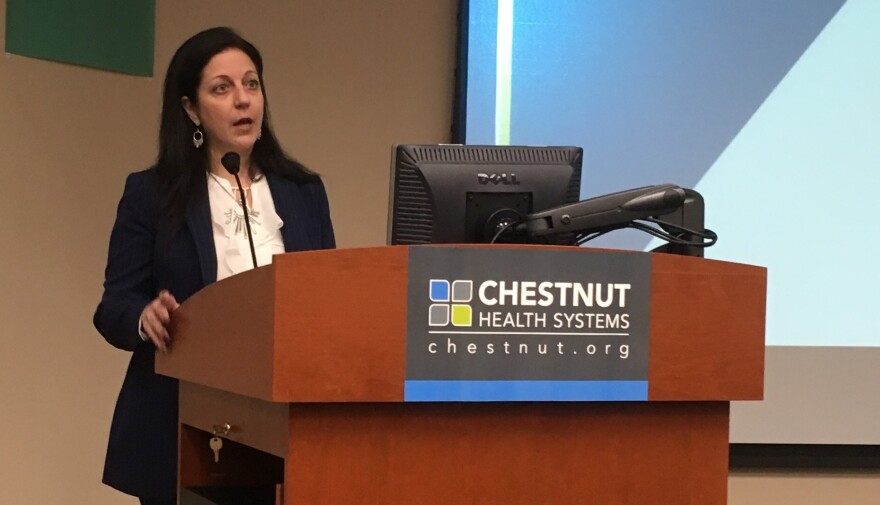For the 99,000 women incarcerated in U.S. prisons, the path to the criminal justice system is littered with broken relationships, physical and sexual abuse, and addiction.
The opportunities for intervention along that path were explored Friday at an event sponsored by the Women’s Justice Institute. About 75 participants attended the program at Chestnut Health System’s training center.
The event is one of a dozen similar meetings held around the state over the past year. The special needs of women and the reasons a record number of them have entered prison are discussed with community and criminal justice stakeholders and ex-offenders.
“Our system is in need of serious change. We need to look at how we can disrupt the pathway to prison,” WJI co-founder Deanne Benos told the audience.
The eight points in a woman’s life where she could be redirected from potential criminal conduct include contacts with social service and police agencies, the court process, and relationships with family and the community, according to the women’s institute.

Nearly every woman living in detention, including the 101,000 held in jails, has been victimized, said Benos.
To illustrate the gap in consequences delivered to perpetrators of sexual violence versus their victims, Benos noted that just 3 of every 100 rapists ever go to prison while victims of sexual abuse are likely be incarcerated at some point in their lives.
The harm done by incarceration goes beyond the women, said Alyssa Benedict, WJI co-founder and consultant, to include the children left behind when a mother is locked up.
“Everyone is harmed by this system,” said Benedict.
Vera Traver, case manager for YWCA Labyrinth House in Bloomington, shared her story of abuse, multiple incarcerations and the loss of her children. The bad behavior began as a young child with stealing food and clothes for her siblings, said Traver.
“If I would have known then that it was the beginning of my criminal future, I would have rather gone hungry,” Traver said in an emotional presentation.
Sexually assaulted as a young girl, Traver turned to alcohol and drugs. Juvenile detention, foster homes and prison followed. The speaker recalled the depression she felt after the birth of her second child during a term at the Dwight Correctional Center.
“I couldn’t stop crying for two weeks. I was messed up with nobody to talk to,” said Traver.
The change came after a stint in drug treatment and an affirmation from public defender Carla Barnes.
“She told me I was beautiful. I couldn’t see any beauty in me. I saw a beast,” said Traver.
Today, Traver works with women who need help after their release from prison with housing, jobs and counseling.
According to data Benedict shared from Loyola University’s Center for Criminal Justice Research, Policy and Practice, several offenses account for most of the female population. Drug delivery and possession brought half of the women to Illinois prisons, and property crimes were behind another 28% of admissions. Charges for violent crime led 22% to prison, with murder charges accounting for about 10%.
In contrast, 44% of the state’s male prison population is charged with a violent crime.
With a 700% increase in the number of women incarcerated nationwide between 1980 and 2014, women reflect the fastest growing population behind bars, noted McLean County Judge Rebecca Foley, regional co-chair of the WJI statewide task force to reduce the women’s prison population.
The assessment tool used by WJI to identify the pathways to prison will soon be used as a nationwide model, said Foley. The Chicago-based women’s institute also has developed new policies to address gender issues in Illinois prisons.


